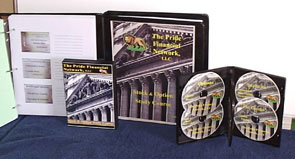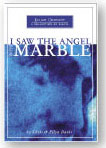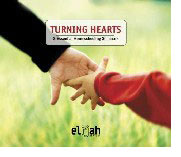Whatever Happened to Curiosity
If you missed past issues of the e-journal, you can read them HERE>>
by Chris Davis
"It was my son's first day of school. As he boarded the bus that day, I was as excited as he was. He was such a clever, creative, inquisitive child. I just knew he would thrive in school. Then, one day, several months later, I picked him up at the bus stop. As he exited the bus, I
suddenly noticed something missing in his eyes. There was no enthusiasm, no spark. It scared me. I said in my heart, 'Who did this to my little boy? Where did his life go?'"
This sad story (or one similar to it) has been experienced countless times since the advent of the public school movement. Maybe you have had a similar experience and that is why your little one doesn't go to school anymore. However, did you know that we can keep our children home and do the same thing to them that has been done to millions of children for over 150 years.
Children come into a world that is filled with wonderful, intriguing; and, yes, sometimes dangerous things. There is an awful lot they need to know. And, there is a whole subculture of trained professionals out there just waiting to get these kids into a room and tell them what they should want to know.
The trouble is, children are curious. God built this into them. They want to know all sorts of stuff. Most of it isn't very important, really. Except to them. What do your children ask you? Their questions are wonderfully creative and, sometimes, annoying.
Whether our children are in school or we are "schooling" them at home, most of us believe that what children should learn has already been established. It is simply up to us to make sure all the information they are to learn actually gets inside of them. But, are these the things our children want to know? If we were honest, we would have to admit the answer would probably be, "No." Of course, we don't ask our children what they are curious about, or what intrigues them, or what they would like to know. After all, who are they? Just kids.
When my sons were younger, I would take an hour or two and read our The Elijah Company catalog out loud to them. That's right, I would read the catalog, page by page, to the boys. In front of me was a piece of paper divided into three parts. As I read the catalog I encouraged the boys to stop me when something sounded interesting that they thought they might want to learn during the coming year. Then I would type out a list of what each boy indicated he was interested in learning. Of course, each child had way more on his list that could possibly be covered during a year, so I spent time with each child and we whittled the list down to a manageable size.
"James," I said during one of these sessions. "You have said you want to raise snakes this year." As I had read through the science section of our catalog, I had come to the category on snakes and James had made me put "snakes" on his list. I didn't mind James raising snakes if that is what he truly wanted to do. I just needed him to know, from my own experience as a boy his age, what raising snakes entailed.
After listening carefully to me, James said, "OK, Dad, maybe I'll do snakes next year." James actually never lost his curiosity for snakes because, although he never raised one, I allowed him to spend as much time as he wanted studying them. Of course, in order to do this with my children, I had to object to the worldview that what children should learn has already been established. Why? Because if we allow our children to do many of the things that interest them, a lot of time is used up that ordinarily would be spent teaching them the "officially" recognized information.
In their very important book, Discover Your Child's Learning Style, authors Willis and Hodson make the following observations:
"When children enter the schoolroom in kindergarten or first grade, their abilities to conform and perform according to preset standards are what they are judged by." And, "...conformity and performance measures are what count. Memorizing facts, taking tests, and receiving grades replace investigating, wondering, discovering, playing, and asking questions." (page 25-26).
We assume children will learn what we want them to learn the way we want them to learn it. What is so very dangerous about this assumption is that, for many children, what we really want for our children is destroyed in the process: that each child develop a lifetime love of learning.
I have written many articles, and spent many years speaking about the one-size-fits-all, graded, generic, in-the-box, prepackaged, scope & sequence curricula that is in use by so many homeschooling families today. This type of curricula were originally produced when the public schooling movement began in the mid 1800's because these are the materials most useful to efficiently educate masses of children in a "factory" model of institutionalized government (or, for that matter, private or Christian) schooling.
In the beginning of the homeschooling movement, the type of curricula mentioned above was not available to homeschooling parents. The reason is that in the early years homeschooling parents weren't at all interested in reproducing the public school model of what children did during the day. Since homeschooled children weren't using the same materials as children who were "in school", publishers initially didn't see homeschoolers as a "market."But, as the homeschooling movement drew families whose primary concern was their children's education, publishers of public, private, and Christian school curricula found a new market for their traditional, Scope & Sequence-style curricula. Homeschooling parents began to try to produce the same kind of high school graduate as the public school, so they began using the same curricula.
In an institutional school setting, a child's abilities to conform and perform to preset standards are what he or she is judged by. I would like to suggest that, in the homeschool setting, what needs to be judged is the level of curiosity found in our children.
I recently read of a study which concluded that 85% of all communication aimed at three year olds is either telling the child not to do something he is doing or how bad he is for having done what he just did. I was astonished. What are all these three year olds doing that they need such continual correction? I would suspect they are exploring and, in so doing, getting into things they shouldn't be getting into.
ENCOURAGING AND NOURISHING CURIOSITY
Take a piece of paper and draw a line from the left of the page to the right. At the extreme left side of the line, write "birth."At the extreme right of the line, write "left home." Somewhere along the line, put "age 12." Now, from birth to about age 12 your child's learning experiences should be as experiential as possible. This is the time for taking ordinary activities (ie. setting the table, building a birdhouse, looking through a microscope) and learning while doing. It is the time to buy lots of field guides and a good microscope. Put a terrarium on the kitchen table (or a counter top) and tell your kids, "Whatever you find outside and you don't know what it is, bring it in and put it in the terrarium. We'll get the field guide and look it up." This is the time to raise pets, get to know the stars, and ask thousands of questions.
Thousands of questions? Yes. You should be asking question every few minutes. And, you don't even have to know the answers. Just ask. "Why do you suppose grass is green and the sky is blue?" "Why are blue flowers so rare in nature?" "Why do so many animals hide from us?" "What is electricity?" Why should you do this? Because children need to know that asking questions is not only an all right thing to do, it is the best way to be a life-long learner.
If your children hear you asking questions all the time, guess what they will grow up doing? That's right. And, if they grow up asking questions, they may not accept just anything and everything they are told. They might actually be immune to pro da and advertising. They will think!
Today's children don't ask questions because, early in their lives, they realize that grown-ups will eventually tell them everything they need to know.
Men have believed many things for long periods of time that turned out to be untrue when someone decided to question their validity. But, first, someone had to ask. One of Einstein's most famous quotes goes like this,
"If the facts don't fit the theory, change the facts." Einstein spent his life questioning accepted scientific beliefs. He said, "Curiosity is more important than knowledge."
And, we should be asking our children questions about Scripture. If Scripture is the most true of truths, our children's faith will be strengthened the more questions we bring to the Bible.
I challenge parents, and I challenge myself, to engender a sense of curiosity in our children. One of the most important words you will ever hear your child say is, "Why?" The second most important word is, "WOW!" This word is full of expression, wonder and inquisitiveness.
Eventually, you will need to add academics to your child's experiential learning. Don't begin this too soon and never allow academics to overwhelm curiosity. One can almost see Einstein shaking his head as he wrote, "It is a miracle that curiosity survives formal education."
Make sure your education is never so formal that one day you notice something important missing in your child's eyes.
Top Resources for Nurturing Children's Differences
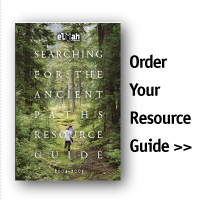 Yes, you can still get a copy of the Elijah Company catalog. The Elijah Company closed in 2005, but you can still get a copy of its last Resource Guide. Yes, you can still get a copy of the Elijah Company catalog. The Elijah Company closed in 2005, but you can still get a copy of its last Resource Guide.
Elijah Company’s catalog has always been one of the most respected—and requested—resources available to home schoolers. People say, “Everyone has got to have the Elijah Company catalog, especially new home schoolers!” and they keep their dog-eared, well-read copies of the catalogs for years. The Resource Guide is jam packed with articles and practical information about how to be successful teaching your children at home.
 Developed by the authors of Discover Your Child's Learning Style, this is the most powerful and user friendly learning styles inventory in the world and it is NOW ONLINE! A Self-Portrait™ Profile assesses several aspects of learning style, quickly and simply, in language that is easily understood by everyone. These aspects are: Disposition, Modality, Environment, Interests, and Talents. If you want help in understanding what makes your child "tick" and how your can help him or her learn easier and better (or find out more about yourself), take this easy, quick learning styles assessment test. For more about this learning styles assessment test, CLICK HERE>> Developed by the authors of Discover Your Child's Learning Style, this is the most powerful and user friendly learning styles inventory in the world and it is NOW ONLINE! A Self-Portrait™ Profile assesses several aspects of learning style, quickly and simply, in language that is easily understood by everyone. These aspects are: Disposition, Modality, Environment, Interests, and Talents. If you want help in understanding what makes your child "tick" and how your can help him or her learn easier and better (or find out more about yourself), take this easy, quick learning styles assessment test. For more about this learning styles assessment test, CLICK HERE>>
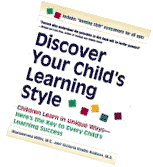 Discover Your Child's Learning Style is a book you need. Period. It has more potential to improve your child's education - and your family relationships - than almost any other book I have ever read. The authors of this book have developed a "Learning Styles Model" of education that helps you discern your child's: Discover Your Child's Learning Style is a book you need. Period. It has more potential to improve your child's education - and your family relationships - than almost any other book I have ever read. The authors of this book have developed a "Learning Styles Model" of education that helps you discern your child's:
• Talents
• Interests
• Preferred learning environment
• Thinking Style
• Modalities
The book includes handy self-tests. Use these to find out just how each child in your family loves to learn... and what teaching approaches help or hinder his learning style. What a huge difference this will make in your homeschool... and in your family relationships!

Discover Your Children's Gifts will help you uncover your children's natural giftings and personality traits. It helps explain why their personality "quirks" are really evidences of their own God-given gifts. The theological foundation is very sound, making good sense of the main passages on spiritual gifts in a way very few others do. Gifts are broken into 1) Manifestation (sign gifts - 1 Cor 12-14; Acts 2) 2) Ministry (equipping gifts - Eph 4) & 3) Motivational (every-Christian-gifts - Rom 12).
 Dreamers, Discoverers and Dynamos. Every now and then a book comes along that fills in so many gaps in my understanding that I want to tell everyone about it. Dr. Pallodino suggests that one in five children is an "Edison Trait child," meaning he or she has one or more of the following: dazzling intelligence, an active imagination, a free-spirited approach to life, and the ability to frustrate the you-know-what out of others. The heart of the issue is that these children think divergently, while schools generally reward convergent thinking. This book discusses the different types of approaches to life your children may have (dreamer, discover, or dynamo) and how you can most help each type succeed. Dreamers, Discoverers and Dynamos. Every now and then a book comes along that fills in so many gaps in my understanding that I want to tell everyone about it. Dr. Pallodino suggests that one in five children is an "Edison Trait child," meaning he or she has one or more of the following: dazzling intelligence, an active imagination, a free-spirited approach to life, and the ability to frustrate the you-know-what out of others. The heart of the issue is that these children think divergently, while schools generally reward convergent thinking. This book discusses the different types of approaches to life your children may have (dreamer, discover, or dynamo) and how you can most help each type succeed.
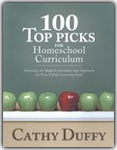 100 Top Picks for Homeschool Curriculum by Cathy Duffy. I've always recommended Cathy's curriculum guides as the best out there for choosing teaching materials that "mesh" with who your family is. Now Cathy guides you through the process, offering her "Top Picks" from each subject area. 100 Top Picks for Homeschool Curriculum by Cathy Duffy. I've always recommended Cathy's curriculum guides as the best out there for choosing teaching materials that "mesh" with who your family is. Now Cathy guides you through the process, offering her "Top Picks" from each subject area.
A major feature of 100 Top Picks is the charts showing the 100 Top Picks in relation to educational approaches, learning styles, and practical features such as prep time needed; design for independent, one-on-one, or group learning; and ease of use for the teacher. Complete reviews of each of the Top Picks provide parents the information they need to make the best choices for each of their children.
The first half of 100 Top Picks covers information that will help you decide your child's learning styles, help you decide what your "Philosophy of Education" is, and help you figure what to teach when. The second half has reviews for all 100 of the top picks. You will gain a lot of insight into what curriculum is available by reading these reviews. She even tosses some extra "Picks" here and there that would've made the list if her book's title was "200 Top Picks".
Resources for rethinking education
 Books by John Gatto. These books will change the way you think about education. Gatto was a public school teacher for decades and New York's Teacher of the Year, so he has first-hand experience with the effects of public schooling. Not only do his books discuss the major issues about what schooling does to our children, he offers insights into what a true education entails and reflects on our society as a whole and the distorted thinking that leads us to subject our children to an influence that robs them of their creativity and enthusiasm for learning. Gatto's books are "MUST READS." Books by John Gatto. These books will change the way you think about education. Gatto was a public school teacher for decades and New York's Teacher of the Year, so he has first-hand experience with the effects of public schooling. Not only do his books discuss the major issues about what schooling does to our children, he offers insights into what a true education entails and reflects on our society as a whole and the distorted thinking that leads us to subject our children to an influence that robs them of their creativity and enthusiasm for learning. Gatto's books are "MUST READS."
Dumbing Us Down
A Different Kind of Teacher
Books by John Holt. Holt's books are wonderfully thought-provoking and give you a real appreciation for the natural learning ability of your children. Read all of these! How Children Learn, Learning All the Time, and Teach Your Own .
Also highly recommended: Guerrilla Learning: How to Give Your Kids a Real Education With or Without School
  Endangered Minds by Jane Healy. Subtitled “Why Children Don't Think and What We Can Do About It,” this is truly a
significant book. The book's premise is that today's children, bombarded by a fast-paced
media culture and with very little interaction with thinking adults, develop different “habits of mind” than children of the past and are therefore unable to tackle the skills involved in learning. Healy clearly explains why our modern lifestyles sabotage
the ability to learn and tells us what to do about it. In the companion book, Your Child's Growing Mind Healy discusses how thinking and learning abilities develop for skills like reading, writing, spelling, proper use of grammar, etc. and what parents can do to create the “mind pathways” that enhance these thinking and learning abilities. These books are "must haves." Endangered Minds by Jane Healy. Subtitled “Why Children Don't Think and What We Can Do About It,” this is truly a
significant book. The book's premise is that today's children, bombarded by a fast-paced
media culture and with very little interaction with thinking adults, develop different “habits of mind” than children of the past and are therefore unable to tackle the skills involved in learning. Healy clearly explains why our modern lifestyles sabotage
the ability to learn and tells us what to do about it. In the companion book, Your Child's Growing Mind Healy discusses how thinking and learning abilities develop for skills like reading, writing, spelling, proper use of grammar, etc. and what parents can do to create the “mind pathways” that enhance these thinking and learning abilities. These books are "must haves."
Resources for choosing teaching materials
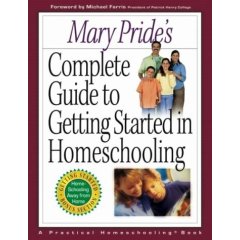 Mary Pride's Complete Guide to Getting Started in Homeschooling. The title can be deceiving, because the book isn't just for those getting started, it's also very helpful to veteran home schoolers who want to re-evaluate what they are doing and the resources that are available to them. Mary Pride's Complete Guide to Getting Started in Homeschooling. The title can be deceiving, because the book isn't just for those getting started, it's also very helpful to veteran home schoolers who want to re-evaluate what they are doing and the resources that are available to them.
Veteran home educators will dive into a vast amounts of up-to-date information with sections on Field Trips, Conferences, Retreats & Homeschool Days for the Whole Family, and Worldview & Leadership Training for Teens. There's also information on how to find everything from contests, to how to write a winning college application essay.
If there were one "top expert" in homeschooling, I would say Mary Pride is it. With her numerous books, Practical Homeschooling Magazine, and website, Mary knows her stuff.
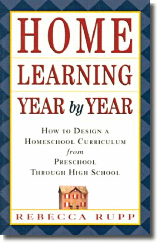 Home Learning Year by Year: How to Design a Homeschool Curriculum from Preschool Through High School by Rebecca Rupp. This book does not come from a Christian orientation, but is one of the few books I know that gives you a checklist of what the traditional pre-K through 12th-grade curriculum expects a child to learn year by year and then tells you how to accomplish the same level of learning at home. Home Learning Year by Year also gives guidelines for the importance of each topic, pointing out which knowledge is essential and which is best for more expansive study based on your child's personal interests. Home Learning Year by Year: How to Design a Homeschool Curriculum from Preschool Through High School by Rebecca Rupp. This book does not come from a Christian orientation, but is one of the few books I know that gives you a checklist of what the traditional pre-K through 12th-grade curriculum expects a child to learn year by year and then tells you how to accomplish the same level of learning at home. Home Learning Year by Year also gives guidelines for the importance of each topic, pointing out which knowledge is essential and which is best for more expansive study based on your child's personal interests.
 Life Skills for Kids by Christine Field is a
guide to equipping your children with the life
skills they will need as adults: people/home
life skills, time/space organization skills,
money management skills, healthy lifestyle
skills, spiritual habits, decision making skills,
creative skills, and celebration skills.
Christine is a home schooling mother herself,
and the book is written in such a way that it
may be used as a reference point and checklist of desired skills
and knowledge to be mastered. Life Skills for Kids by Christine Field is a
guide to equipping your children with the life
skills they will need as adults: people/home
life skills, time/space organization skills,
money management skills, healthy lifestyle
skills, spiritual habits, decision making skills,
creative skills, and celebration skills.
Christine is a home schooling mother herself,
and the book is written in such a way that it
may be used as a reference point and checklist of desired skills
and knowledge to be mastered.
   Homeschooling the Early Years Homeschooling the Early Years
Homeschooling the Middle Years
Homeschooling the Teen Years
Each of these books is a guide to successfully
homeschooling the age group it covers. Starting with
what makes the age group tick, chapters cover the
important aspects of learning, practical ways to approach
each subject area, and the many paths to success.
  What Your Kindergartner Needs to Know What Your Kindergartner Needs to Know
What Your First Grader Needs to Know
What Your Second Grader Needs to Know
What Your Third Grader Needs to Know
What Your Fourth Grader Needs to Know
What Your Fifth Grader Needs to Know
What Your Sixth Grader Needs to Know
This series of books covers what a child at each grade level should be learning in every subject. The books are great to have around to help you design your own curriculum and make sure you aren't leaving any "gaps." History, language arts, science, and several other subjects are covered in enough detail that the book could become your primary textbook for those subjects, but math is summarized, so further teaching materials may be needed there. As you develop your own "Home School Reference Center" of books you can refer to over and over, these need to have their own place there.
More coming in the next issue . Stay tuned....
View past ejournals HERE>>
P.S. Here are the webpages I've finished. Each page listed will take you to more pages on that topic.
Webpages about choosing teaching materials
Webpages about the importance of reading great books and booklists for children of all ages
Any article appearing on this website may be copied or forwarded electronically provided that proper credit is given and that the article is not substantively modified.
No article may appear in whole or in part in a publication sold for profit or as part of any commercial endeavor without the written consent of Home School Marketplace.
© Copyright 2006. Home School Marketplace, 1053 Eldridge Loop, Crossville, TN 38571.
Be sure to sign up for our ejournal!
Sign up below.
|


 Discover Your Child's Learning Style
Discover Your Child's Learning Style
 Dreamers, Discoverers and Dynamos.
Dreamers, Discoverers and Dynamos. 100 Top Picks for Homeschool Curriculum
100 Top Picks for Homeschool Curriculum

 Endangered Minds
Endangered Minds
 Home Learning Year by Year: How to Design a Homeschool Curriculum from Preschool Through High School
Home Learning Year by Year: How to Design a Homeschool Curriculum from Preschool Through High School Life Skills for Kids
Life Skills for Kids

 Homeschooling the Early Years
Homeschooling the Early Years
 What Your Kindergartner Needs to Know
What Your Kindergartner Needs to Know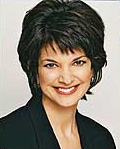 Image Teleconference was a Huge Success
Image Teleconference was a Huge Success 

